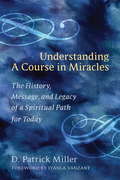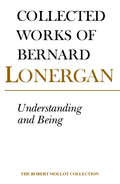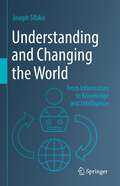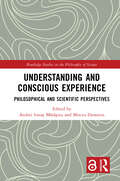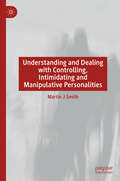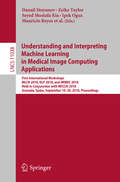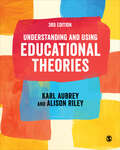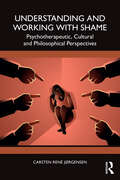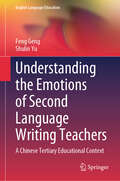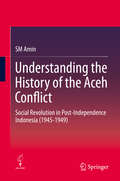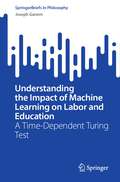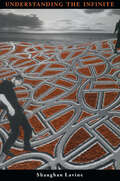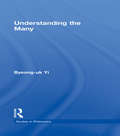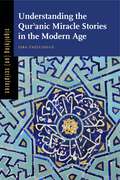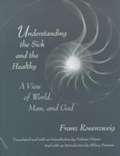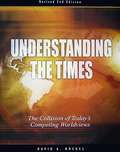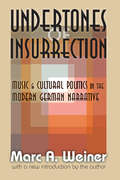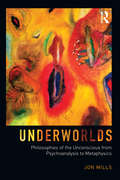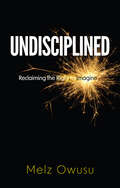- Table View
- List View
Understanding a Course in Miracles
by Iyanla Vanzant D. Patrick MillerThis comprehensive introduction to the grassroots phenomenon A Course in Miracles covers the book's role in America's changing spiritual landscape, investigates its origins and history, and explains its principal tenets and philosophies. Weaving together extensive research and student perspectives, journalist D. Patrick Miller sheds light on the provocative and oft-misunderstood text. An examination of the teachings and influence of A Course in Miracles, one of the most popular and controversial texts in contemporary spirituality. With a new foreword by Iyanla VanzantCovers common questions, such as What exactly is the Course? Is it Christian, Buddhist, New Age, or something else entirely? How did the author channel the message? More than two million copies of A Course in Miracles available worldwide in 19 languages, with thousands of study groups devoted to it. From the Trade Paperback edition.
Understanding and Being: The Halifax Lectures on Insight, Volume 5
by Bernard Lonergan Elizabeth Morelli Mark MorelliBernard Lonergan (1904-1984) was a noted Canadian philosopher and theologian. He devoted his life to articulating a generalized method of inquiry and its implications, not only for the human and natural sciences, but also for a better world and a higher quality of human life. His own clear vision showed him the need to overcome the terrible fragmentation of knowledge and life in our time. The struggle to achieve an integrated view is the theme that unified the body of his work. In the history of that struggle, Understanding and Being plays a central role. Published a year after his profound and complex Insight, it is the edited transcription of some thirty hours of Lonergan's lectures on that seminal book. Understanding and Being serves as a guide to the very challenging terrain of Insight, or, as one commentator put it, if Insight is the Everest in the range of Lonergan's works, Understanding and Being is the approach through rolling foothills. This edition, the second, incorporates more of the historical setting in the text and adds a wealth of explanatory notes, as well as previously unedited discussions that followed the lectures.
Understanding and Changing the World: From Information to Knowledge and Intelligence
by Joseph SifakisThis book discusses the importance of knowledge as an intangible asset, separate from physical entities, that can enable us to understand and/or change the world. It provides a thorough treatment of knowledge, one that is free of ideological and philosophical preconceptions, and which relies exclusively on concepts and principles from the theory of computing and logic. It starts with an introduction to knowledge as truthful and useful information, and its development and management by computers and humans. It analyses the relationship between computational processes and physical phenomena, as well as the processes of knowledge production and application by humans and computers. In turn, the book presents autonomous systems that are called upon to replace humans in complex operations as a step toward strong AI, and discusses the risks – real or hypothetical – of the careless use of these systems. It compares human and machine intelligence, attempting to answer the question of whether and to what extent computers, as they stand today, can approach human-level situation awareness and decision-making. Lastly, the book explains the functioning of individual consciousness as an autonomous system that manages short- and long-term objectives on the basis of value criteria and accumulated knowledge. It discusses how individual values are shaped in society and the role of institutions in fostering and maintaining a common set of values for strengthening social cohesion. The book differs from books on the philosophy of science in many respects, e.g. by considering knowledge in its multiple facets and degrees of validity and truthfulness. It follows the dualist tradition of logicians, emphasizing the importance of logic and language and considering an abstract concept of information very different from the one used in the physical sciences. From this perspective, it levels some hopefully well-founded criticism at approaches that consider information and knowledge as nothing more than the emergent properties of physical phenomena. The book strikes a balance between popular books that sidestep fundamental issues and focus on sensationalism, and scientific or philosophical books that are not accessible to non-experts. As such, it is intended for a broad audience interested in the role of knowledge as a driver for change and development, and as a common good whose production and application could shape the future of humanity.
Understanding and Conscious Experience: Philosophical and Scientific Perspectives (Routledge Studies in the Philosophy of Science)
by Mircea Dumitru Andrei Ionuț MărăşoiuThis volume explores how understanding relates to conscious experience. In doing so, it builds bridges between different philosophical disciplines and provides a metaphysically robust characterization of understanding, both in and beyond science.The past two decades have witnessed growing interest from epistemologists, philosophers of science, philosophers of mind and ethicists in the nature and value of intellectual understanding. This volume features original essays on understanding and the phenomenal experiences that underlie it. The chapters are divided into three thematic sections. Part 1 provides theoretical characterizations of understanding, including Henk de Regt’s defense of a contextual theory of scientific understanding and a debate on whether scientific inference and explanatory power are necessary or central features of understanding. Part 2 explores how conscious experience and understanding are related. The chapters articulate a phenomenal theory of understanding and address themes that are connected to understanding, including awareness, transformative experiences and exemplification. Finally, Part 3 is devoted to domain-specific inquiries about understanding, such as logical proofs, particle physics and moral understanding.Understanding and Conscious Experience will be of interest to scholars and advanced students working in the philosophy of science, epistemology, philosophy of mind, ethics and phenomenology.
Understanding and Dealing with Controlling, Intimidating and Manipulative Personalities
by Martin J SmithThis book will examine at individuals who control, intimate, and manipulate in work, home, family, and social environments, using robust Psychological theory to comprehend and successfully tackle those who exhibit these behaviours. The focus of this book will be to look at general Personality theory together with more specific focus on the Dark Triad of personality traits and, from the Five Factor Model, the domain of Agreeableness vs Antagonism. This approach will build a greater understanding of a much broader form of controlling intimidating and manipulative personality type. The book will include both useable techniques as well as self-reflection exercises the reader can use or pass on to students, clients and service users. This book is based on a programme the author has been teaching for over twelve years to a range of audiences across a variety of roles and has also been highlighted frequently in the press over the past decade.
Understanding and Interpreting Machine Learning in Medical Image Computing Applications: First International Workshops, Mlcn 2018, Dlf 2018, And Imimic 2018, Held In Conjunction With Miccai 2018, Granada, Spain, September 16-20, 2018, Proceedings (Lecture Notes in Computer Science #11038)
by Sergio Pereira Mauricio Reyes M. Jorge Cardoso Ipek Oguz Lena Maier-Hein Danail Stoyanov Zeike Taylor Anne Martel Seyed Mostafa Kia Andre F. Marquand Edouard Duchesnay Tommy Löfstedt Bennett Landman Carlos A. Silva Raphael MeierThis book constitutes the refereed joint proceedings of the First International Workshop on Machine Learning in Clinical Neuroimaging, MLCN 2018, the First International Workshop on Deep Learning Fails, DLF 2018, and the First International Workshop on Interpretability of Machine Intelligence in Medical Image Computing, iMIMIC 2018, held in conjunction with the 21st International Conference on Medical Imaging and Computer-Assisted Intervention, MICCAI 2018, in Granada, Spain, in September 2018. The 4 full MLCN papers, the 6 full DLF papers, and the 6 full iMIMIC papers included in this volume were carefully reviewed and selected. The MLCN contributions develop state-of-the-art machine learning methods such as spatio-temporal Gaussian process analysis, stochastic variational inference, and deep learning for applications in Alzheimer's disease diagnosis and multi-site neuroimaging data analysis; the DLF papers evaluate the strengths and weaknesses of DL and identify the main challenges in the current state of the art and future directions; the iMIMIC papers cover a large range of topics in the field of interpretability of machine learning in the context of medical image analysis.
Understanding and Using Educational Theories
by Karl Aubrey Alison RileyThis textbook gives readers a clear overview of a selection of 19 of the most influential thinkers on education, including established names (Vygotsky, Bruner, Dewey), more recent thinkers (Freire, hooks, Claxton) and other key names whose writing has helped shaped our views on teaching and learning. Each chapter includes practical examples showing how theories can be used to inform classroom teaching, and critiques of each theorist exploring opposing viewpoints and the strengths and weaknesses of different ideas. This third edition includes: New chapters on Barak Rosenshine and Daniel Goleman Revamped reflective tasks with a greater practical focus for the classroom More models and theoretical diagrams throughout This is an essential primer for any university course that includes learning theory, with particular relevance for initial teacher education, education studies and early childhood degrees. Karl Aubrey has recently retired from his post at Bishop Grosseteste University. Alison Riley is the Programme Leader for the BA Early Childhood Studies at Bishop Grosseteste University.
Understanding and Using Educational Theories
by Karl Aubrey Alison RileyThis textbook gives readers a clear overview of a selection of 19 of the most influential thinkers on education, including established names (Vygotsky, Bruner, Dewey), more recent thinkers (Freire, hooks, Claxton) and other key names whose writing has helped shaped our views on teaching and learning. Each chapter includes practical examples showing how theories can be used to inform classroom teaching, and critiques of each theorist exploring opposing viewpoints and the strengths and weaknesses of different ideas. This third edition includes: New chapters on Barak Rosenshine and Daniel Goleman Revamped reflective tasks with a greater practical focus for the classroom More models and theoretical diagrams throughout This is an essential primer for any university course that includes learning theory, with particular relevance for initial teacher education, education studies and early childhood degrees. Karl Aubrey has recently retired from his post at Bishop Grosseteste University. Alison Riley is the Programme Leader for the BA Early Childhood Studies at Bishop Grosseteste University.
Understanding and Working with Shame: Psychotherapeutic, Cultural and Philosophical Perspectives
by Carsten René JørgensenThis book discusses the pivotal role of shame in a wide range of mental disorders and as a driving force in societal polarization and escalating conflicts between nations and population groups.Exploring the phenomenology of one of the most vulnerable and painful of human emotions, shame, Jørgensen dives deep into its many facets and the ways in which it manifests in mental illnesses and everyday life. Delving into an in-depth discussion of the differentiation between the moral and ethical feelings of guilt and shame, he presses the need to distinguish between constructive and destructive feelings of shame. He examines how shame permeates societal and cultural expectations, on both individual and collective levels. Solution-centric in its approach, the author not only discusses the destructive feelings of shame particularly common among individuals with more severe mental disorders, but also offers specific advice to therapists on how to deal with it.The book will be an essential read for psychoanalysts, psychotherapists, philosophers, and anyone wanting to understand the power of shame in our lives.
Understanding the Cold War: History, Approaches and Debates
by Elspeth O'RiordanThis book provides an advanced introduction to the Cold War, assessing its origins, development and conclusion as a dynamic interaction between superpower confrontation and complex regional and local situations. The evolution of the subject’s scholarly debate is discussed throughout and the contest situated alongside enduring historical themes including decolonisation, development, nationalism and globalisation. Regional case studies, on Europe, East and Southeast Asia, Latin America and the Middle East, illuminate the Cold War’s global reach. Thematic analysis considers competition in military, strategic and economic spheres, as well as in aspects of culture, ideology, society, and Human Rights. The Cold War’s transnational elements and facets of international cooperation are also highlighted. The book unpacks the subject’s extensive scholarly discourse, underlining the interdisciplinary character of today’s Cold War historiography and the importance of understanding that its development has been informed by a vibrant interface between international history, international relations and the Cold War itself.
Understanding the Emotions of Second Language Writing Teachers: A Chinese Tertiary Educational Context (English Language Education #40)
by Shulin Yu Feng GengThis book incorporates both practice-based information and research to underpin teachers' emotions in the teaching and learning settings of second language (L2) writing, in the Chinese tertiary educational context. It introduces and validates a new conceptual framework for evaluating the causes and effects of the emotions of L2 writing teachers and investigates their emotional experiences in the context of the classroom. Additionally, it demonstrates the mediating effect of emotion-regulation strategies on L2 writing teachers’ pedagogical practices, writing assessment practices, teacher–student relationships, and well-being. Finally, this book provides theoretical, practical, and pedagogical implications of emotion regulation and management in order to implement the L2 writing curriculum.
Understanding the History of the Aceh Conflict: Social Revolution in Post-Independence Indonesia (1945-1949)
by SM AminThis book is the first English translation of the original text Atjeh Sepintas Lalu published in 1950 in Bahasa Indonesia by one of Indonesia’s leading lawyers, writers, and political figures, examining the history of the continuously turbulent Aceh. The book describes the legal and political situation in Aceh between 1945 and 1949, considering the events and incidents that related to the government, judiciary, civil servants, and life of the parties at the time. It unpacks the dispute between two major streams of thoughts that cut across the people of Aceh during that era – one based on religious teachings, and the other on secular principles. What followed was the unavoidable emergence of disparate groups, which, in turn, yielded conflict. The author, as a former insider in the Aceh government, was able to uncover the 'inside story' on the ground, in analyzing and discussing this fragment of the history of Aceh. A unique resource, this translation – presented six decades after it was first made available – is still invaluable today, allowing readers to interpret the events that occurred in Aceh at the time in the context of an understanding of Aceh’s development today. This book will be of keen interest to specialists in Islamic law, regionalism, historians of Indonesia, as well as social scientists interested in the early post-independence history of Indonesia.
Understanding the Impact of Machine Learning on Labor and Education: A Time-Dependent Turing Test (SpringerBriefs in Philosophy)
by Joseph GanemThis book provides a novel framework for understanding and revising labor markets and education policies in an era of machine learning. It posits that while learning and knowing both require thinking, learning is fundamentally different than knowing because it results in cognitive processes that change over time. Learning, in contrast to knowing, requires time and agency. Therefore, “learning algorithms”—that enable machines to modify their actions based on real-world experiences—are a fundamentally new form of artificial intelligence that have potential to be even more disruptive to labor markets than prior introductions of digital technology. To explore the difference between knowing and learning, Turing’s “Imitation Game,”—that he proposed as a test for machine thinking—is expanded to include time dependence. The arguments presented in the book introduce three novel concepts: (1) Comparative learning advantage: This is a concept analogous to comparative labor advantage but arises from the disparate times required to learn new knowledge bases/skillsets. It is argued that in the future, comparative learning advantages between humans and machines will determine their division of labor. (2) Two dimensions of job performance—expertise and interpersonal: Job tasks can be sorted into two broad categories. Tasks that require expertise have stable endpoints, which makes these tasks inherently repetitive and subject to automation. Tasks that are interpersonal are highly context-dependent and lack stable endpoints, which makes these tasks inherently non-routine. Humans compared to machines have a comparative learning advantage along the interpersonal dimension, which is increasing in value economically. (3) The Learning Game is a time-dependent version of Turing’s “Imitation Game.” It is more than a thought experiment. The “Learning Game” provides a mathematical framework with quantitative criteria for training and assessing comparative learning advantages. The book is highly interdisciplinary—presenting philosophical arguments in economics, artificial intelligence, and education. It also provides data, mathematical analysis, and testable criteria that researchers in these fields will find of practical use. The book calls for a rethinking of how labor markets operate and how the education system should prepare students for future jobs. It concludes with a list of counterintuitive recommendations for future education and labor policies that all stakeholders—employers, employees, educators, students, and political leaders—should heed.
Understanding the Infinite
by Shaughan LavineAn accessible history and philosophical commentary on our notion of infinity.How can the infinite, a subject so remote from our finite experience, be an everyday tool for the working mathematician? Blending history, philosophy, mathematics, and logic, Shaughan Lavine answers this question with exceptional clarity. Making use of the mathematical work of Jan Mycielski, he demonstrates that knowledge of the infinite is possible, even according to strict standards that require some intuitive basis for knowledge.Praise for Understanding the Infinite“Understanding the Infinite is a remarkable blend of mathematics, modern history, philosophy, and logic, laced with refreshing doses of common sense. It is a potted history of, and a philosophical commentary on, the modern notion of infinity as formalized in axiomatic set theory . . . An amazingly readable [book] given the difficult subject matter. Most of all, it is an eminently sensible book. Anyone who wants to explore the deep issues surrounding the concept of infinity . . . will get a great deal of pleasure from it.” —Ian Stewart, New Scientist“How, in a finite world, does one obtain any knowledge about the infinite? Lavine argues that intuitions about the infinite derive from facts about the finite mathematics of indefinitely large size . . . The issues are delicate, but the writing is crisp and exciting, the arguments original. This book should interest readers whether philosophically, historically, or mathematically inclined, and large parts are within the grasp of the general reader. Highly recommended.” —D. V. Feldman, Choice
Understanding the Many
by Byeong-uk YiFirst Published in 2002. Routledge is an imprint of Taylor & Francis, an informa company.
Understanding the Political Philosophers: From Ancient to Modern Times
by Alan HaworthUnderstanding the Political Philosophers is an absorbing and accessible introduction to the major philosophers and core texts of western political philosophy. Organised historically - beginning with Socrates and Plato, and concluding with post-Rawlsian theory - Alan Haworth presents the key ideas and developments with clarity and depth. Each chapter provides a concentrated study of a given thinker or group of thinkers and together they constitute a broad account of the main arguments in political philosophy. There are chapters on Socrates, Plato, Aristotle, Hobbes, Locke, Rousseau, the Utilitarians, Marx, and Rawls’s early work. This revised second edition has been brought fully up-to-date, and includes expanded coverage of the period from the death of Aristotle to the sixteenth century, as well as a new chapter on Rawls’s later philosophy and the direction of post-Rawlsian philosophy. Including a chronology and suggestions for further reading, Understanding the Political Philosophers is an ideal introductory text for students taking courses in political philosophy or political theory.
Understanding the Qurʾanic Miracle Stories in the Modern Age (Signifying (on) Scriptures #3)
by Isra YaziciogluUnderstanding the Qurʾanic Miracle Stories in the Modern Age explores the ways in which meaningful implications have been drawn from stories of miracles in the Qurʾan. Isra Yazicioglu describes the fascinating medieval Muslim debate over miracles and connects its insights with early and late modern turning points in Western thought and with contemporary Qurʾanic interpretation. Building on an apparent tension within the Qurʾan and analyzing crucial cases of classical and modern Muslim engagement with these miracle stories, she illustrates how an apparent site of conflict between faith and reason, or revelation and science, can lead to fruitful exchange.A distinctive contribution to a new trend in Qurʾanic studies, this volume reveals the presence of insightful Qurʾanic interpretation outside of the traditional line-by-line commentary genre, engaging with the works of Ghazali, Ibn Rushd, and Said Nursi. Scholars of Islam, philosophy, and the intersection of science and religion will especially want to engage with Yazicioglu’s study.
Understanding the Qurʾanic Miracle Stories in the Modern Age (Signifying (on) Scriptures)
by Isra YaziciogluUnderstanding the Qurʾanic Miracle Stories in the Modern Age explores the ways in which meaningful implications have been drawn from stories of miracles in the Qurʾan. Isra Yazicioglu describes the fascinating medieval Muslim debate over miracles and connects its insights with early and late modern turning points in Western thought and with contemporary Qurʾanic interpretation. Building on an apparent tension within the Qurʾan and analyzing crucial cases of classical and modern Muslim engagement with these miracle stories, she illustrates how an apparent site of conflict between faith and reason, or revelation and science, can lead to fruitful exchange.A distinctive contribution to a new trend in Qurʾanic studies, this volume reveals the presence of insightful Qurʾanic interpretation outside of the traditional line-by-line commentary genre, engaging with the works of Ghazali, Ibn Rushd, and Said Nursi. Scholars of Islam, philosophy, and the intersection of science and religion will especially want to engage with Yazicioglu’s study.
Understanding the Sick and the Healthy: A View of World, Man, and God
by Franz RosenzweigFranz Rosenzweig, one of the century's great Jewish thinkers, wrote his gem of a book in 1921 as a more accessible precis of his famous Star of Redemption. An elegant introduction to Rosenzweig's "new thinking," Understanding the Sick and the Healthy was written for a lay audience and takes the form of an ironic narrative about convalescence. With superb simplicity and beauty, it puts forth an important critique of the nineteenth-century German Idealist philosophical tradition and expresses a powerful vision of Jewish religion. Harvard's Hilary Putnam provides a new introduction to this classic work for a contemporary audience.
Understanding the Tacit (Routledge Studies in Social and Political Thought #81)
by Stephen P. TurnerThis book outlines a new account of the tacit, meaning tacit knowledge, presuppositions, practices, traditions, and so forth. It includes essays on topics such as underdetermination and mutual understanding, and critical discussions of the major alternative approaches to the tacit, including Bourdieu’s habitus and various practice theories, Oakeshott’s account of tradition, Quentin Skinner’s theory of historical meaning, Harry Collins’s idea of collective tacit knowledge, as well as discussions of relevant cognitive science concepts, such as non-conceptual content, connectionism, and mirror neurons. The new account of tacit knowledge focuses on the fact that in making the tacit explicit, a person is not, as many past accounts have supposed, reading off the content of some sort of shared and fixed tacit scheme of presuppositions, but rather responding to the needs of the Other for understanding.
Understanding the Times: The Collision of Today's Competing Worldviews (Revised 2nd edition)
by David NoebelComparison of Christianity vs. Islam, Secular Humanism, Marxism, Cosmic Humanism, and Postmodernism in the areas of theology, philosophy, ethics, biology, psychology, sociology, law, politics, economics, and history.
Understanding the geocivilizational aspect in the West: An historical look from a new approach (HISTORY / Europe / Philosophy #1)
by Ahmed SarireteThe international consensus built around the Western model and its civilizational approach, in recent decades, has not been long in showing signs of fragility in the face of structural crises induced by the push for unfair globalization. The doubts that are aroused by the not very reassuring management of this project of globalization and major global crises, such as the global Covid-19 pandemic, which has taken hold of all nations, nevertheless deserve a pause for deep reflection to better understand this unprecedented situation in human history! In this essay, I make my significant contribution in understanding the new process of human civilization, which has become a unique model for all contemporary nations, according to my "geocivilizational" approach, and offer a lucid and serene look at the historical causes of the leadership of Westerners.
Undertones of Insurrection: Music and Cultural Politics in the Modern German Narrative
by Marc WeinerA basic tenet of literary studies is that aesthetic structures are politically significant because they represent an artist's response to the political implications of cultural codes with which the recipient of the modern work is also acquainted. This tenet provides the basis for the ideological associations attending the appearance of music in the modern German narrative. With his understanding of the arts as involved in often unacknowledged ideological forces within a culture, Marc Weiner's Undertones of Insurrection bridges the gap between the "New Musicology's" rewarding infusion of modern cultural and literary theory into the study of music, politically insightful examinations of narrative structures in the modern novel, and the methodologically conservative area of musical-literary relations in Germanic Studies. In other words, the questions it raises are different from those pursued in most examinations of music and literature, because previous works of this kind concerning the literature of German-speaking Europe have often disregarded social concerns in general, and political issues in particular.Ranging from 1900 to Doctor Faustus (1947), Weiner study sets the stage by examining public debates that conflated such issues as national identity, racism, populism, the role of the sexes, and xenophobia with musical texts. In the literary analyses that follow, Weiner discusses both obvious connections between music and sociopolitical issues--Hesse's equation of jazz and insurrection in Steppenwolf--and covert ones, the suppression of music in Death in Venice and the use of politically charged musical subtexts in Werfel's Verdi and Schnitzler's Rhapsody. By uncovering the ideological agendas informing cultural practice in modernist Germany, Undertones of Insurrection calls for a reevaluation of the function of music in the modern German narrative.
Underworlds: Philosophies Of The Unconscious From Psychoanalysis To Metaphysics
by Jon MillsThe first book of its kind to provide a detailed analysis of the history of the unconscious from the underworlds of Greek and Egyptian mythology to psychoanalysis and metaphysics, Jon Mills presents here a unique study of differing philosophies of the unconscious. Mills examines how three major philosophical systems on the nature of the unconscious emerge after modern philosophy, finding their most celebrated elaborations in Freud, Lacan and Jung. These three psychoanalytic traditions, quite separate from one another in terms of their emphasis and philosophical presuppositions, are scrutinised alongside contemporaneous movements in existential phenomenology, semiotics, epistemology, transcendental psychology and Western metaphysics in the texts of Hegel, Heidegger, Sartre and Whitehead. Underworlds provides a scholarly exegesis and critique of the main philosophies of the unconscious to have transpired in the history of ideas. Exploring the unconscious from its philosophical beginnings in antiquity to its systematic articulation brought about by the rise of psychoanalysis, Underworlds is ideal for practicing psychoanalysts, academics of Freud, Jung and Lacan, and scholars of psychology, philosophy and the humanities.
Undisciplined: Reclaiming the Right to Imagine
by Melz OwusuUndisciplined is an odyssey into possibility. Challenging us to break free from limiting strictures and structures, it encourages readers to envision just futures and reflect on the inner transformation required to become the custodians of those worlds.In a profound and heartfelt offering, Melz Owusu delves into the stifling impact of the education system on imagination. They probe alternative, deeply spiritual connections to knowledge, and the pursuit of new ways of being as acts of remembrance of a common past. Seamlessly transitioning between intellectual discourse, personal reflections, and spiritual contemplations, Melz navigates the ‘undisciplining’ of mind and spirit, guiding readers towards the healing and liberatory potential of the heart and the imagination.Undisciplined is not a prescriptive manual but an invitation. Freedom takes many forms, and this book is intended as one route of exploration: a mind-opening and perspective-shifting appraisal of how we might imagine a more just and liberated world, and the path to accessing its beauty.
